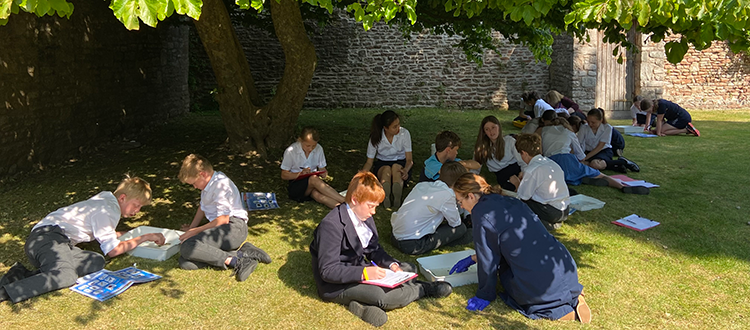Exciting discoveries in Year 7’s species interdependence topic
In a thrilling exploration of species interdependence, Year 7 pupils embarked on a fascinating pond-dipping adventure. With wide-eyed wonder, our curious young scientists identified an array of fascinating organisms.
Among the diverse findings were the nymphs of dragonflies, damselflies, and stoneflies, showcasing the intriguing stages of their aquatic development. The pond also revealed the presence of pond slaters, pond skaters, bloodworms, water fleas, and tadpoles undergoing their incredible metamorphosis into frogs. The pond-dipping excursion offered an abundance of sights and opportunities for hands-on exploration. The pupils were captivated as they witnessed the remarkable adaptations and interconnectedness of these aquatic organisms.
It was a true celebration of the biodiversity that exists within our local ecosystem. By actively engaging with nature, Year 7 pupils not only gained a deeper understanding of the delicate balance of species interdependence but also developed their observation skills and scientific knowledge. They were able to witness firsthand how these organisms rely on each other for survival, highlighting the importance of preserving and protecting our natural environments.
Among the diverse findings were the nymphs of dragonflies, damselflies, and stoneflies, showcasing the intriguing stages of their aquatic development. The pond also revealed the presence of pond slaters, pond skaters, bloodworms, water fleas, and tadpoles undergoing their incredible metamorphosis into frogs. The pond-dipping excursion offered an abundance of sights and opportunities for hands-on exploration. The pupils were captivated as they witnessed the remarkable adaptations and interconnectedness of these aquatic organisms.
It was a true celebration of the biodiversity that exists within our local ecosystem. By actively engaging with nature, Year 7 pupils not only gained a deeper understanding of the delicate balance of species interdependence but also developed their observation skills and scientific knowledge. They were able to witness firsthand how these organisms rely on each other for survival, highlighting the importance of preserving and protecting our natural environments.



